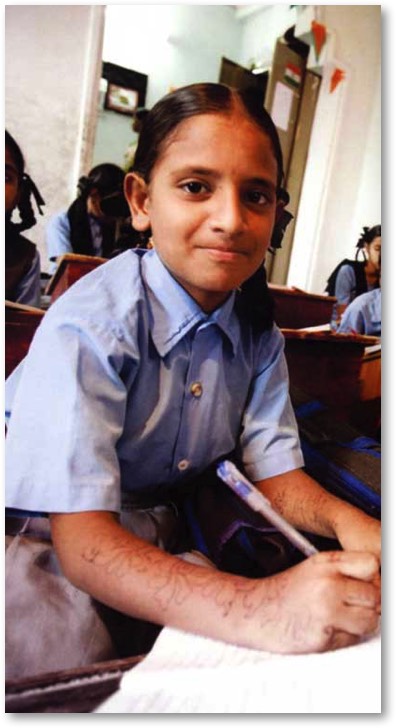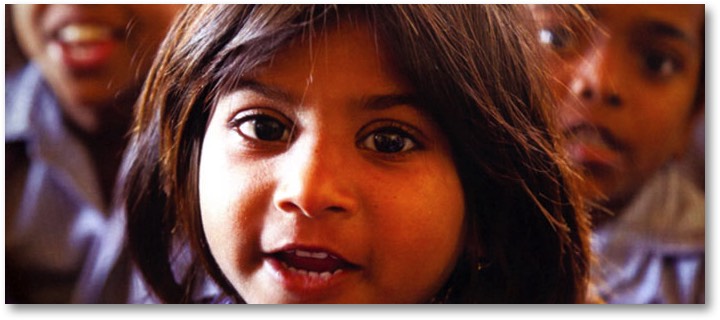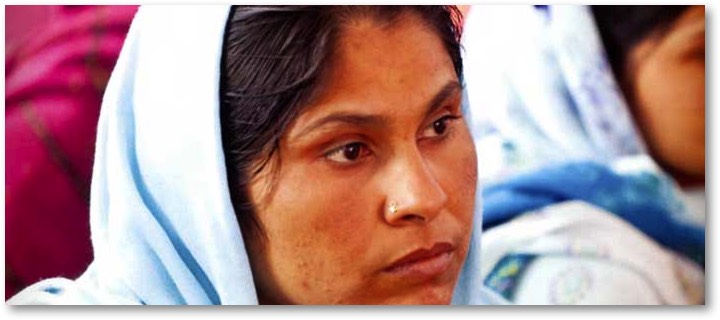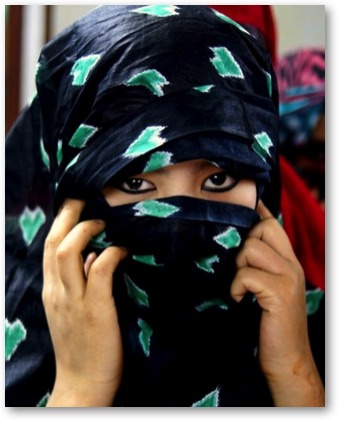
A TRUST BETRAYED
SILENT SCREAMS OF A LITTLE GIRL
At a very young age, Devi lost both her parents and her aunt became her main guardian. Her aunt, having never wanted a child, consulted with her other relatives. They decided to send Devi off to a residential school in the nearby city of Hyderabad. Devi was to return to her home only during her vacations. It was an arrangement that suited the aunt perfectly since she was unemployed and was supported by her lover, her babu. She had no interest in the girl.
During one of these vocational breaks, the aunt's lover began to take an interest in Devi. As an adolescent girl of 15, Devi was oblivious to the advances made towards her by the so called "uncle", but he continued to pester her and asked her aunt to hand over Devi to him.
One day, the aunt complied and conveniently left Devi alone at home with her lover. The babu used this opportunity to force himself on Devi. She resisted him but he overpowered her, beat her physically and raped her repeatedly. Her aunt remained silent over the whole episode and showed no remorse towards her niece in the following days. Devi did not understand why her aunt and "uncle" would do this to her and began to repress her feelings in the face of this trauma. Finally, once she returned to her school she decided to inform the people in charge there.The school then reported this to Child Welfare Committee who in turn referred Devi for rehabilitation to Prajwala.
On arrival at Prajwala's shelter home, Devi was in a state of shock and was completely withdrawn and expressionless about everything. Over a period of time, with help from people around her and several counselling sessions, Devi finally showed signs of healing. She started to interact with the other children and participate in various activities.
Finally, 4 years since the incident, Devi has gained confidence in herself. She is currently in her second year of college and plans to work in the hospitality sector.
SILENT SCREAMS OF A LITTLE GIRL
At a very young age, Devi lost both her parents and her aunt became her main guardian. Her aunt, having never wanted a child, consulted with her other relatives. They decided to send Devi off to a residential school in the nearby city of Hyderabad. Devi was to return to her home only during her vacations. It was an arrangement that suited the aunt perfectly since she was unemployed and was supported by her lover, her babu. She had no interest in the girl.
During one of these vocational breaks, the aunt's lover began to take an interest in Devi. As an adolescent girl of 15, Devi was oblivious to the advances made towards her by the so called "uncle", but he continued to pester her and asked her aunt to hand over Devi to him.
One day, the aunt complied and conveniently left Devi alone at home with her lover. The babu used this opportunity to force himself on Devi. She resisted him but he overpowered her, beat her physically and raped her repeatedly. Her aunt remained silent over the whole episode and showed no remorse towards her niece in the following days. Devi did not understand why her aunt and "uncle" would do this to her and began to repress her feelings in the face of this trauma. Finally, once she returned to her school she decided to inform the people in charge there.The school then reported this to Child Welfare Committee who in turn referred Devi for rehabilitation to Prajwala.
On arrival at Prajwala's shelter home, Devi was in a state of shock and was completely withdrawn and expressionless about everything. Over a period of time, with help from people around her and several counselling sessions, Devi finally showed signs of healing. She started to interact with the other children and participate in various activities.
Finally, 4 years since the incident, Devi has gained confidence in herself. She is currently in her second year of college and plans to work in the hospitality sector.

AN EVERYDAY STORY
FAMILIAR BUT HEART WRENCHING
Sanjana was born in a working class family in a village near Hyderabad, the only sister amongst six brothers. Her parents were daily wage labourers and times were hard. All seven children had to stop attending school and start working in order to try to contribute to the family income. Despite their efforts, the family could not meet their basic needs and therefore relocated to Hyderabad in search of a better livelihood.
Sanjana was 12 years old when she began working as a domestic worker in Hyderabad. Her family was not too happy with the wages she brought home so they started ill-treating her. Unable to bear the physical and mental abuse, Sanjana decided to run away from her home with only Rs.20 in her pocket. As she was aimlessly wandering around she was approached by a stranger. She refused to humour him, so he followed her, beat her and forced her to have sex with him. Then Sanjana overhead him plotting to turn her into a prostitute. Once again she ran away and landed at the Afzalgunj area police station. Luckily for her, a kind hearted policeman noticed her plight and heard her story.
The policeman had attended Prajwala's sensitization programme and was aware of the heinous crime of sex trafficking rampant in Hyderabad and how young, poor girls are vulnerable to trafficking. The police referred Sanjana to Prajwala for safe custody.
Sanjana is now in a safe environment and pursuing her studies along with other girls of her age group. She dreams of becoming a teacher.
FAMILIAR BUT HEART WRENCHING
Sanjana was born in a working class family in a village near Hyderabad, the only sister amongst six brothers. Her parents were daily wage labourers and times were hard. All seven children had to stop attending school and start working in order to try to contribute to the family income. Despite their efforts, the family could not meet their basic needs and therefore relocated to Hyderabad in search of a better livelihood.
Sanjana was 12 years old when she began working as a domestic worker in Hyderabad. Her family was not too happy with the wages she brought home so they started ill-treating her. Unable to bear the physical and mental abuse, Sanjana decided to run away from her home with only Rs.20 in her pocket. As she was aimlessly wandering around she was approached by a stranger. She refused to humour him, so he followed her, beat her and forced her to have sex with him. Then Sanjana overhead him plotting to turn her into a prostitute. Once again she ran away and landed at the Afzalgunj area police station. Luckily for her, a kind hearted policeman noticed her plight and heard her story.
The policeman had attended Prajwala's sensitization programme and was aware of the heinous crime of sex trafficking rampant in Hyderabad and how young, poor girls are vulnerable to trafficking. The police referred Sanjana to Prajwala for safe custody.
Sanjana is now in a safe environment and pursuing her studies along with other girls of her age group. She dreams of becoming a teacher.

A LITTLE SPARK
HELP COMES IN ALL SIZES
Roopwas, Ghatauli and Ludhawai villages, barely 20 miles from the famous Bharatpur bird sanctuary of Rajasthan, are like countless other villages of India steeped in poverty but the difference is that they are trying to modernise their ramshackle houses in narrow lanes. However, the homes here are built on the earnings of young girls from the Bedia, Nat and Kanjar communities who work as prostitutes. The girls are traditionally pushed into prostitution at about the age of eleven to support their entire families, including their fathers and brothers. These men are either unwilling or unable to get jobs.
Anarkali's story is much the same. She comes from a family where the men live off the earnings through prostitution of their sisters, daughters and nieces. She did not want such a life and appealed to her family to let her marry instead. They refused and she was sent to Mumbai to 'learn the trade', like other girls of this region. She came back broken and unhappy.
Anarkali's 13-year-old nephew Deepak, a boy currently studying in the school run by GNK, took up his favourite aunt's cause. He made her visit the school and speak to the representatives of this NGO. Here, she got guidance, support and knowledge of the other possible life options for herself. Deepak also repeatedly argued on her behalf with his family and initiated many meetings between the family and social workers of GNK.
After much persuasion, Anarkali finally got married. And now, Deepak's family sends all the girls of their family to school. They are a role model to others in this area.
HELP COMES IN ALL SIZES
Roopwas, Ghatauli and Ludhawai villages, barely 20 miles from the famous Bharatpur bird sanctuary of Rajasthan, are like countless other villages of India steeped in poverty but the difference is that they are trying to modernise their ramshackle houses in narrow lanes. However, the homes here are built on the earnings of young girls from the Bedia, Nat and Kanjar communities who work as prostitutes. The girls are traditionally pushed into prostitution at about the age of eleven to support their entire families, including their fathers and brothers. These men are either unwilling or unable to get jobs.
Anarkali's story is much the same. She comes from a family where the men live off the earnings through prostitution of their sisters, daughters and nieces. She did not want such a life and appealed to her family to let her marry instead. They refused and she was sent to Mumbai to 'learn the trade', like other girls of this region. She came back broken and unhappy.
Anarkali's 13-year-old nephew Deepak, a boy currently studying in the school run by GNK, took up his favourite aunt's cause. He made her visit the school and speak to the representatives of this NGO. Here, she got guidance, support and knowledge of the other possible life options for herself. Deepak also repeatedly argued on her behalf with his family and initiated many meetings between the family and social workers of GNK.
After much persuasion, Anarkali finally got married. And now, Deepak's family sends all the girls of their family to school. They are a role model to others in this area.

SUSHMA: A MIDDLE CLASS GIRL
South India
Sushma, 20, had everything: good looks, good health, caring parents who ran a small coffee plantation in Coorg, and a brother. She lived in a college hostel in a different city. Then a man named Anu befriended her parents, portraying himself as a wealthy orphan hungry for love. Sushma’s parents accepted him, despite the fact that he was Muslim and they were Hindus. Soon, he was carrying parcels to their daughter and began taking her on outings and returning her safely to the hostel. But tragedy soon unfolded.
Sushma disappeared in December 2011. Her frantic parents filed a police complaint on Christmas Day in 2011 and also appealed to the Odanadi project in Mysore. The LILY Foundation supports the work of Odanadi.
Investigations revealed that Anu, 49, aka Anwar Faisal, is a contract killer wanted by the police of several states. He has murdered, raped and maimed many by chopping off their hands. Recently, a girl’s body severed in half was found in the river, presumably one of his victims. Another young woman, whom Anu had introduced to Sushma’s parents, has also disappeared. He’s been implicated in crimes involving at least 16 other young women.
Sushma made a single phone call to her family after her disappearance in which she sounded disoriented and appeared not to know them. She was probably drugged by Anu.
Directors of the Odanadi project, Stanly and Parshu, recently travelled to Kerala after receiving a tip-off that Sushma might be found there. Since they are part of the National Task Force they had managed to obtain Anu’s phone records, which led them to a large compound in Kerala, in a predominantly Muslim neighbourhood, heavily guarded by thugs and security cameras. They contacted one of his gang members and offered him amnesty if he could deliver Sushma to them and turn witness against Anu. Alerted, Anu fled.
Criminals prey on gullible parents, vulnerable girls and defenceless children. Human trafficking is a major organized crime in India. The LILY Foundation supports projects that work against the evil trade.
Anu is believed to be travelling between Karnataka, Tamilnadu and Kerala with his gang of 20 and an unknown woman. Even as you read this, the Odanadi directors are still negotiating with Anu’s gang but Sushma is still missing.
